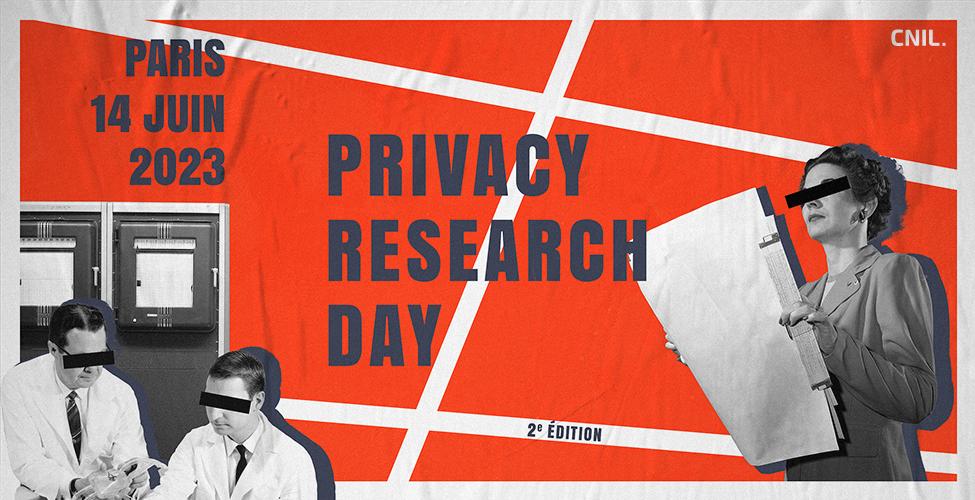Call for presentations for Privacy Research Day 2023
On June 14, 2023, the CNIL will host in Paris the second edition of its international conference dedicated to research in the fields of privacy and data protection. Privacy Research Day has been thought as a stage where international researchers are invited to present their work. The call for papers is open until March 17, 2023.

For this new annual Privacy Research Day conference, the CNIL invites the scientific community to present academic publications and research projects in the fields of privacy and data protection.
The CNIL is particularly interested in rigorous and empirical research from computer scientists and social scientists. Multidisciplinary research, including several fields, will be particularly encouraged.
The CNIL is inviting contributions of the following types:
- Recently published research papers in international peer-reviewed conferences of journals;
- Research projects in advanced state or close to completion;
- Demonstrations of privacy-protective technologies (PETs).
Suggested topics include:
Effectiveness of data protection rights
The GDPR is celebrating its 5th anniversary. The subject of data protection has undeniably the subject of data protection has gained in traction. How do data subjects perceive the benefits of the GPDR on a daily basis? In which situations do they observe benefits ?Where do they perceive a lack of change or even deterioration? Contributions can concern the analysis of the exercise of rights but also the way entities circumvent the spirit of the GPDR (e.g. with dark patterns), as well as studies on users' expectations. How free and informed is consent?
New digital identities
Identity is not a singular concept. In addition to the legal (or civil) identity, everyone has a series of identities and faces, both in the physical world and online, which offer and have offered opportunities for different communities to emancipate themselves. What roles for multiple identities in the construction of people? How does the notion of identity(ies) remain in decentralised networks? What are the new forms of identity tracking, especially with virtual/augmented reality? Faced with deepfakes, what are the remaining identity markers?
Data in Artificial Intelligence
How does data protection frame AI learning? How is data labelled? What are the solutions to create privacy-friendly AI? What are the effects of dataset annotations on trained AI? How to maintain the databases used for AI? How to enable the exercise of rights in an AI context? What are the uses of digital twins and how are they regulated?
Data portability
How is this right perceived by users, by data controllers and by economic actors who could use it? Why is this right still little used? What are the inspiring initiatives and concept to stimulate the use of portability? What are the good examples in this field? What challenges did they face? Who is using it and what are the problems encountered? How do users relate to and differ from the right of access?
Protecting anonymity online
Protecting anonymity online remains a much-explored area of research. What are the current solutions for being anonymous online and for what purposes? Can we really be anonymous and if so at what cost (financial or in terms of features)? Do we have examples of people who maintain their anonymity online? Who seeks to be anonymous and anonymous to whom (service providers, acquaintances, the state,…) ? What are the practices and main pitfalls of online anonymity?
When PETs go wide
The rise of Privacy Enhancing Technologies is providing effective data protection solutions. Technologies that until recently seemed purely theoretical are now being deployed widely: synthetic data, homomorphic encryption, Zero Knowledge Proof, differential privacy and federated learning are now being implemented in real-life situations. What are the impacts on user data protection? What is the legal impact of these technologies? Do the adoption and deployment of these technologies create new problems? What are the new uses of PETs? What are the next expected developments?
And other research related to personal data and privacy protection.
Event Format
The conference will take place on June 14, 2023, in Paris, at the CNIL and will be livestreamed.
Several multidisciplinary thematic sessions will be organized, during which researchers will present their research, pointing out the stakes for privacy and personal data protection, policy and law in the EU. These presentations will be put in perspective with the reflections and work of the CNIL on this subject. Given the international scope of the event, the working language will be English.
Selection Criteria and Review Process:
- Submissions may be for research that has been previously presented (or is in the process of being reviewed) at conferences or has already been published (or is soon to be published).
- Submissions must come from researchers who wish to present their own research, completed after January 1, 2021.
- Proposals will be evaluated by CNIL experts, based on an assessment of the quality of the submissions, their relevance to CNIL's concerns, and the need to cover a diverse range of topics representing a variety of perspectives.
- Researchers who submit their contributions will be notified on April 24th, 2023, if they have been selected to present at this conference.
- Researchers can submit multiple contributions.
Important dates
- Deadline for submission: March 17th, 2023
- Notification to researchers: April 24th, 2023
- Confirmation to present: May 2nd, 2023
- Finalized presentation materials (slide deck and/or videos): June 1st, 2023
- Conference: June 14th, 2023
Submission Process
As part of your submission through the web-based form, please include the following information:
- First and last name, email address, phone number, job title, and affiliation of researcher(s) making the submission;
- A single point of contact for communications with the teams of the CNIL;
- The title of the research you propose to present along with an abstract summarizing your methodology, findings, and how your research differs from prior research in this area;
- Publication details for any research that has been previously published or accepted for publication;
- Your published or submitted for publication research paper or extended abstract if you submit a presentation of a project;
- Any additional information you would like to share (optional);
- A link to your professional webpage or a short bio (optional);
- Whether you would like your research paper/abstract to be published on CNIL’s website. If you do not request confidential treatment of your submission, your research paper/abstract will be placed on the CNIL’s website of Privacy Research Day to be accessible to the conference’s participants.
Contact details
For any questions, contact ip[@]cnil.fr



